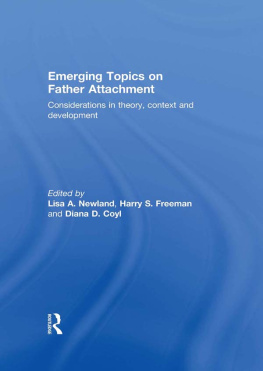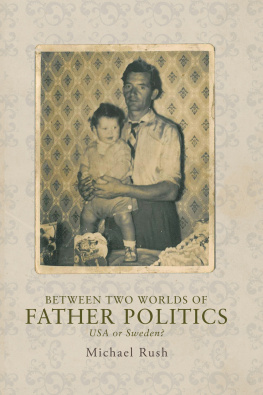First published in Great Britain in 2016 by
Policy Press University of Bristol 1-9 Old Park Hill Bristol BS2 8BB UK Tel +44 (0)117 954 5940 e-mail
North American office: Policy Press c/o The University of Chicago Press 1427 East 60th Street Chicago, IL 60637, USA t: +1 773 702 7700 f: +1 773-702-9756
Policy Press 2016
British Library Cataloguing in Publication Data
A catalogue record for this book is available from the British Library
Library of Congress Cataloging-in-Publication Data
A catalog record for this book has been requested
ISBN 978-1-4473-1899-6 Hardcover
ISBN 978-1-4473-1903-0 ePub
ISBN 978-1-4473-1904-0 Mobi
The right of Marina A. Adler and Karl Lenz to be identified as editors of this work has been asserted by them in accordance with the Copyright, Designs and Patents Act 1988.
All rights reserved: no part of this publication may be reproduced, stored in a retrieval system, or transmitted in any form or by any means, electronic, mechanical, photocopying, recording, or otherwise without the prior permission of Policy Press.
The statements and opinions contained within this publication are solely those of the contributors and editors and not of the University of Bristol or Policy Press. The University of Bristol and Policy Press disclaim responsibility for any injury to persons or property resulting from any material published in this publication.
Policy Press works to counter discrimination on grounds of gender, race, disability, age and sexuality.
Cover design by Dave Rodgers
Front cover image: istock
Readers Guide
This book has been optimised for PDA.
Tables may have been presented to accommodate this devices limitations.
Image presentation is limited by this devices limitations.
Marina A. Adler (USA) is Professor of Sociology in the Department of Sociology and Anthropology at the University of Maryland, Baltimore County, USA. Her research involves cross-national gender, work and family intersections, inequality (race, class, gender), social policy, and social change.
Matthew Aldrich (UK) is a Lecturer in Economics at the University of East Anglia (UEA), and the Associate Dean for Employability at the Faculty of Social Sciences. His interests are in microeconomics, labour economics and the economics of the public sector. His research includes the relationship between human capital, soft skills and the labour market, the changing nature of work roles in families, and the decline of the male-breadwinner model.
Sara Connolly (UK) is a Professor in Personnel Economics at the Norwich Business School, University of East Anglia (UEA) and the UEA lead for the Eastern Academic Research Consortium (between UEA and the Universities of Essex and Kent) in the Quantitative Social Sciences. Her research interests are in gender and the labour market and current projects include fatherhood in the 21st century, gender differences in the professions, and careers and management in international public administrations.
Petteri Eerola (Finland) is Postdoctoral Researcher and Lecturer of Education and Family Studies at the University of Tampere, Finland. His research focuses on mens parental practices and gendered parenting.
iva Humer (Slovenia) is Research Fellow at the Peace Institute, Institute for Contemporary Social and Political Studies, Ljubljana, Slovenia. Her current research areas cover topics related to gender, care, families, fatherhood and gender-equality politics.
Jouko Huttunen (Finland) is a Senior Lecturer (Emeritus) of Family Studies in the Department of Education at the University of Jyvskyl, Finland, where he previously served as Professor of Education and Chair. His research focuses on gendered parenting practices in different family contexts and fathering experiences in the narratives of Finnish fathers.
Karl Lenz (Germany) is Professor and Chair of Micro-Sociology, as well a Vice-Rector for University Planning, at the TU Dresden, Germany. His research focuses on the sociology of personal relationships, sociology of gender and the life course.
Margaret OBrien (UK) is Professor of Child and Family Policy at University College London where she directs the Thomas Coram Research Unit. Her research interests are in fathers, work and family life, comparative studies of parental leave systems, gender, care and work through the life course, and fathers and family support.
Eloise Poole (UK) is a Policy and Research Officer at Arts Council England. She was previously a Senior Researcher in the Children, Family and Work Team at NatCen Social Research. Her research interests include family relationships, the parental role and arts and cultural engagement.
Elisabetta Ruspini (Italy) is Senior Associate Professor of Sociology in the Department of Sociology and Social Research at the University of Milano-Bicocca, Italy. Her research interests include the social construction of gender identities, gender role convergences, and transformations of motherhood and fatherhood.
Svetlana Speight (UK) is a Research Director at NatCen Social Research. Her research interests are in gender, fatherhood and early childhood education and care. Her current projects include fatherhood in the 21st century and an evaluation of early years education in England.
Yve Stbel-Richter (Germany) is Professor of Health Sciences at the University of Applied Sciences Zittau/Grlitz, Germany. Her research in medical sociology focuses on fertility and gendered aspects of health, and the relationship between inequalities at work and health.
Nada Stropnik (Slovenia) is Senior Researcher at the Institute for Economic Research, Ljubljana, Slovenia. Her main research areas are family policy, social policy, worklife balance, poverty and social inclusion.
Maria Letizia Tanturri (Italy) is Associate Professor of Demography in the Department of Statistical Sciences at the University of Padua, Italy. Her research focuses on the determinants of childlessness and on the relationship between gender arrangements, time use and reproductive behaviour.
Marina A. Adler and Karl Lenz
The social context of parenting, care work and paid work, as well as the gender division of labour, has been affected by large-scale societal trends relating to gender values, family structures and workplaces over the last few decades (Kamerman and Moss, 2009; Olh et al, 2014). As part of the changing landscape of parenting in Western advanced countries since the 1970s, women have increasingly become earners in addition to still being the main providers of childcare, and the dominance of male-breadwinner households continues to erode (Lewis, 2002). However, due to cultural perceptions of masculinity and fatherhood, in daily practice, mens provider position in the family has remained more relevant than their participation in childcare. Specifically, despite increased cultural expectations that men should be active and involved fathers, men have changed much less than women with regard to the amount of care and paid work they perform (OECD, 2012). Fatherhood is clearly in transition and being challenged by often contradictory forces: societal expectations to be both an active father and provider; mens own wish to be more involved with their children; and the institutional context in which fathers work and live. There is a gap between cultural ideals, personal aspirations and the structures that would encourage and facilitate new, more inclusive male identities and active fatherhood (Lewis, 2002; Hobson and Fahln, 2009, 2012). Hence, in terms of combining work and care responsibilities, mothers have almost closed the gender gap in employment, but fathers continue to show a care deficit (Hochschild, 2002), and increasingly feel workfamily conflict (Aumann et al, 2011). This book explores these phenomena in the context of cross-national variation in governmental and workplace policies and their relation to the daily childcare practice of fathers.







